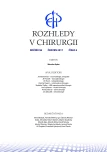Salvage lymph node dissection in radical prostatectomy failure – a case study
Authors:
N. Marečková; M. Staník; D. Macík; J. Doležel
Authors‘ workplace:
Oddělení urologické onkologie, Klinika operační onkologie LF Masarykovy univerzity a Masarykova onkologického ústavu Brno
přednosta: doc. MUDr. R. Šefr, Ph. D.
Published in:
Rozhl. Chir., 2017, roč. 96, č. 6, s. 260-262.
Category:
Case Report
Overview
Salvage lymph node dissection is a therapeutic option in patients with nodal-only recurrence after radical prostatectomy. Although this operation does not achieve a complete cure in the majority of cases, it can prolong survival and help postpone hormonal therapy in selected patients while being a relatively safe procedure.
The authors describe a case study of a radical prostatectomy patient with radiologically proven recurrence of prostate cancer limited to an internal iliac node. He underwent salvage lymph node dissection with a complete biochemical response. Remission lasts 13 months following surgery and the patient is currently without the need for androgen deprivation therapy.
Key words:
salvage lymph node dissection − prostate cancer − radical prostatectomy − neoplasm recurrence
Sources
1. Pond GR, Sonpavde G, de Wit R, et al. The prognostic importance of metastatic site in men with metastatic castration-resistant prostate cancer. Eur Urol 2014;65 : 3–6.
2. Picchio M, Briganti A, Fanti S, et al. The role of choline positron emission tomography/computed tomography in the management of patients with prostate-specific antigen progression after radical treatment of prostate cancer. Eur Urol 2011;59 : 51–60.
3. Scattoni V, Picchio M, Suardi N, et al. Detection of lymph-node metastases with integrated [11C]choline PET/CT in patients with PSA failure after radical retropubic prostatectomy: results con-firmed by open pelvic-retroperitoneal lymphadenectomy. Eur Urol 2007;52 : 423–9.
4. Abdollah F, Briganti A, Montorsi F, et al. Contemporary role of salvage lymphadenectomy in patients with recurrence following radical prostatectomy. Eur Urol 2015;67 : 839−49.
5. Tilki D, Reich O, Graser A, et al. 18F-Fluoroethylcholine PET/CT identifies lymph node metastasis in patients with prostate-specific antigen failure after radical prostatectomy but underestimates its extent. Eur Urol 2013;63 : 792–6.
6. Rigatti P, Suardi N, Briganti A, et al. Pelvic/retroperitoneal salvage lymph node dissection for patients treated with radical prostatec-tomy with biochemical recurrence and nodal recurrence detected by [11C]choline positron emission tomography/computed tomog-raphy. Eur Urol 2011;60 : 935–43.
7. Suardi N, Gandaglia G, Gallina A, et al. Long-term outcomes of salvage lymph node dissection for clinically recurrent prostate cancer: Results of a single-institution series with a minimum follow-up of 5 years. Eur Urol 2015;67 : 299−309.
8. Castellucci P, Fuccio C, Nanni C, et al. Influence of trigger PSA and PSA kinetics on 11C-choline PET/CT detection rate in patients with biochemical relapse after radical prostatectomy. J Nucl Med 2009;50 : 1394–400.
9. 9 Jilg CA, Rischke HC, Reske SN, et al. Salvage lymph node dissection with adjuvant radiotherapy for nodal recurrence of prostate cancer. J Urol 2011;60 : 935–43.
Labels
Surgery Orthopaedics Trauma surgeryArticle was published in
Perspectives in Surgery

2017 Issue 6
- Possibilities of Using Metamizole in the Treatment of Acute Primary Headaches
- Metamizole vs. Tramadol in Postoperative Analgesia
- Spasmolytic Effect of Metamizole
- Metamizole at a Glance and in Practice – Effective Non-Opioid Analgesic for All Ages
-
All articles in this issue
- Surgical therapy of ovarian cancer
- Total pelvic exenteration – strategy and extent of surgery
- Obstructed defecation syndrome – review article
- Malignant tumors of the small bowel
- Salvage lymph node dissection in radical prostatectomy failure – a case study
- Kombinovaná léčba měkkotkáňového sarkomu v oblasti pánve
- Carney triad
- Perspectives in Surgery
- Journal archive
- Current issue
- About the journal
Most read in this issue
- Obstructed defecation syndrome – review article
- Malignant tumors of the small bowel
- Surgical therapy of ovarian cancer
- Kombinovaná léčba měkkotkáňového sarkomu v oblasti pánve
